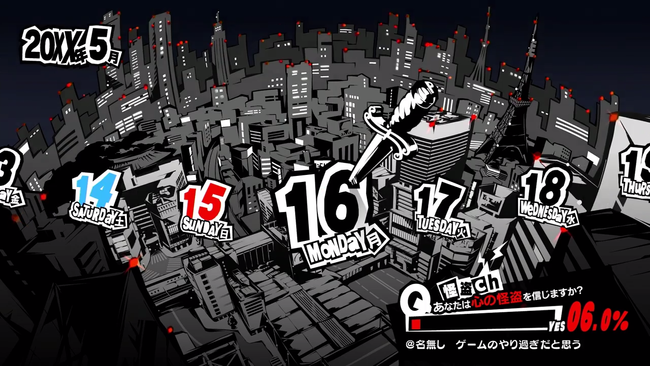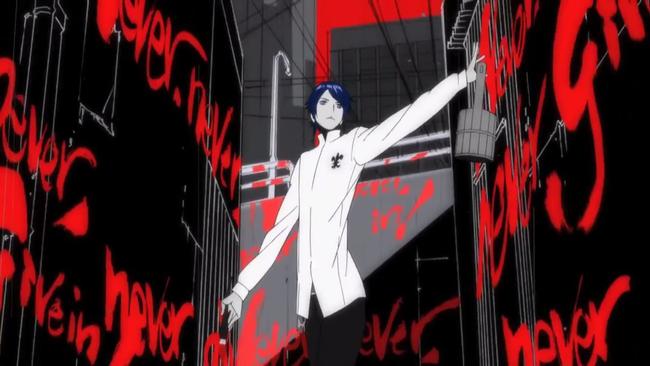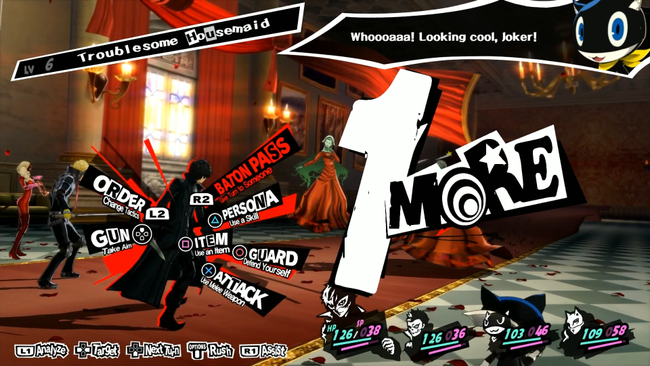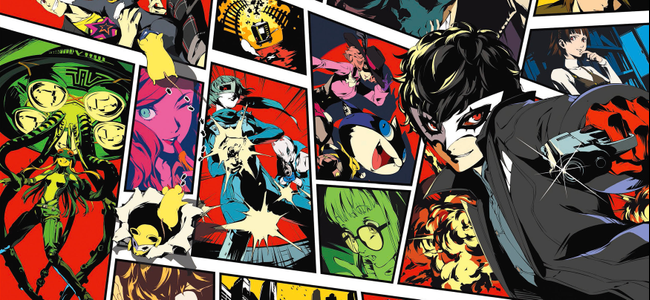
Persona and its Future to Come
Now that series producer and director Katsura Hashino is stepping down from the next entries, Persona is in a bit of a bind. Does it traverse the familiar ground the last three mainline games pursued again? Or should it reinvent the wheel once more much like how Persona 3 approached it?
Though we loved Persona 5 in our review, we feel that the series is in dire need of a different direction. Persona 5 showed us that there are inherent flaws to the core framework and having a new lead presents a huge opportunity to breathe new life into the Persona IP.
Here are a few things we’d like to see in Persona 6 and beyond to shake up the formula. Note that there are minor spoilers for Persona 5 down below.
Get Rid of the Calendar Date System
Recent Persona games have really piled on the hours - lasting well over 50 hours and Persona 5 pushes double that for many players. Now we’re fine with long RPGs, but the pace of the story’s flow has suffered as a result. This dedication to playing out each day has had its time in the spotlight. We think it’s time to say goodbye to that now.
Due to this architecture, Persona now finds itself making awkward plotline concessions to fit this mold. This is most noticeable when we knocked out some of Persona 4’s Midnight Channel dungeons and Persona 5’s Palaces in a single day. The stiffness of the calendar-date system gates story progress to a specific deadline and is pushed to conjure up reasons to justify it.
Perhaps the most absurd example in Persona 5’s case is when players have to wait for Futaba to wake up from her slumber at the end of the 4th Palace. If you completed it early on, you’ll be awkwardly waiting for about three weeks for that story beat to happen!

Eliminating the calendar date structure reopens the road for more fluid storytelling. Critical events in the middle parts of the game won’t have to feel so distant from one another. All three Personas with it have had lulls roughly around the same time because the high school aspect is intertwined so closely to the calendar date.
Thus, they’ve all had their fair share of padding to fill in the gaps which really adds up the hours. Whether it be in the form of school trips, festivals, or other miscellaneous endeavors, it just feels that it has to stretch itself out of necessity to adhere to the calendar dates. The absence of it doesn’t mean that these fun events have to go either; days can still fly by without the game reminding you that it’s currently July 5th of 20XX.
While the original Persona and both parts of Persona 2 bear their own flaws, the structure of their storytelling didn’t hinder the flow of story beats. Persona 2 Innocent Sin and Eternal Punishment were able to tell tightly knit tales, yet still weaved amusing events into its narrative.
Social Links / Confidant Integration into the Main Scenario
There’s a constantly irritating problem the Persona games have faced since Persona 3 introduced this mechanic: they have little to no impact on the central plot. For example, if you maxed Rise’s S-Link in Persona 4 and decided to romance her, she’ll tell you she loves you and yet... it doesn’t change how she interacts with you in the main story. It’s like there are two versions of Rise afterwards: your girlfriend via S-Link and your navigator friend in dungeons. The way she acts and reacts towards the player character doesn’t change in the story regardless.
Hearing that Social Links were returning as Confidants in Persona 5 was an exciting prospect. We assumed that these were going to be a more socially involved from previous Personas. Unfortunately, Confidants are only a smidge better than Social Links; they do provide more extended gameplay benefits, but the social interactions remain quite shallow.

One thing that people have always enjoyed about Bioware’s Mass Effect and Dragon Age series is how your romantic interest had an impact on the story and also included party members' reactions to it. In Dragon Age Origins, romancing the morally ambiguous Morrigan would lead to disapproval from other allies. This makes sense! Morrigan isn’t exactly a ‘good’ person and will undoubtedly have a bad influence on you.
Now relationships aren’t perfect in Bioware’s RPGs either - they also have their own set of issues. The key difference is they don’t feel as if they exist in a vacuum the way Social Links/Confidants do in Persona. For a future game, it would be nice if P-Studio found a way for both your platonic and romantic relationships be acknowledged as you progress through the core path adding that little bit more immersion to the experience.
The Enemy of my Enemy is...
The Persona franchise has done an awesome job driving home the notion that everyone is much more than they appear to be. What defines a person is usually never your first impression of them. Many characters, minor or major, are rooted in the minds of fans.
That’s why we want future Personas to be more risky with this idea; Persona 5 provided with us a brief glimpse of this with Goro Akechi. We’ll avoid getting into the nitty gritty details. We'll say that Goro presents an interesting case for creative party dynamics in future titles. Of course, Persona is no stranger to gray-area developments for allies; Innocent Sin’s Jun and Eternal Punishment’s Baofu both have unique circumstances as well. Even Shinjiro in Persona 3 falls in with this crowd though Persona 5 takes it a step further.

It’d be lovely if Persona started to delve into more morally questionable party members. Perhaps even take a few cues from Arc Rise Fantasia where a chunk of your party flat-out becomes an antagonistic faction several hours into the game.
There’s a lot of potential in the idea of opposing viewpoints that flatout do not mesh well together. Party conflicts do happen already in Persona game; ramping them up to new heights would be a welcome advancement. For now, we're crossing our fingers that future Persona titles strive to be more ambitious in this way.
Combat Wows and Woes
Though Persona is a Megami Tensei spinoff series, the games tend to have less intricate battle systems than its brethren. On the other hand, it often makes up for it through its slick presentation. There are few moments in gaming that are as satisfying as exploiting an enemy's weakness and executing an All-Out Attack.
No doubt that it is a visual feast for the eyes (especially in Persona 5) and is the textbook definition of ‘pizzaz’ in video games. One glaring problem though; these games are lengthy, so repetitive enemy encounters are inevitable. The general strategy for Persona has boiled down to a process of elimination via poking enemies with every element until you find its weak one.
This stays true from the first enemy encounter all the way to the last boss. Thankfully in Persona 5’s case, the Technical mechanic heightened the importance of status ailments. Technicals, along with Baton Passes, are good steps in the right direction for sure. Nonetheless, it needs to do more.

For instance, Shin Megami Tensei: Strange Journey incorporated the series’ staple alignment system in a creative way. Instead of opting for the iconic Press Turns, Strange Journey has players execute follow-up attacks from weaknesses only by demons with the same alignment in your party. Maybe Persona should adapt this... it’d invite the possibility of influencing a character’s moral alignment even. We won’t deny that prospect does sound intriguing now that we’ve pondered about it.
Another thing we’d like to see return, or at least tweaked, are for Persona characters to employ an additional Persona. Either have it like older Persona games where you can freely assign any Persona to anyone or Persona Q with one additional, pre-determined Sub-Persona. It currently feels too rigid with the way things are. We're interested in seeing how Atlus will approach combat next time around.
Be Fearless: Experiment and Reinvent
Above all, Persona shouldn’t alter things solely for the sake of being different. Strengthen what you already do well on top of rectifying inherent problems. Persona 3 solved the sluggish pace of combat that its predecessors had. It continued to one-up them by embracing a bold new coat of paint in visual presentation and a funky down-to-earth feel expressed in its sound design. Persona 4 and Persona 5 went on to refine this formula to varying degrees.
Thus, Persona 6 should go for a completely new take. Maybe try switching character perspectives much like how Yakuza 0 handles it? Dual protagonists with established identities and personalities would certainly have us excited. Transfer control in chapter transitions as both main characters gradually meet their own party members, crossover once in awhile, and unite all together in the final stretches.
Another intriguing approach falls more in line with improvements to Social Links. Overhaul or expand them by having several of them be intertwined with others, rather than just the main character alone. A complex web packed full of gameplay benefits instead of a linear flowchart with one individual in the center of it all. If The Tower is on good terms with The Hermit, those two characters get a strength buff at the start of combat; on the flipside, both will get weakened instead if they hate each other.

This would also encourage the production of more events that contain multiple Social Links interacting with each other too. There are still many possibilities to the concept of Social Links and we sincerely hope Atlus begins to capitalize on it in substantial ways. After all, we’re all trapped in a maze of relationships.
With all that said, we understand that the formula P-Studio created with Persona 3 is near and dear to many people's hearts for good reason; they've all been excellent! That said, there's still room for improvement and we've seen the team's ability to fix what doesn't work already. Dungeons in Persona 3 and 4 were often criticised for their monotony, so P-Studio stepped up to the plate and Persona 5 blew us away with its Palace designs. Learning from past mistakes, accentuating core strengths, and weeding out flaws are things Persona does well.
Persona 5 is finally out and with it, an era of Persona possibly comes to a close.